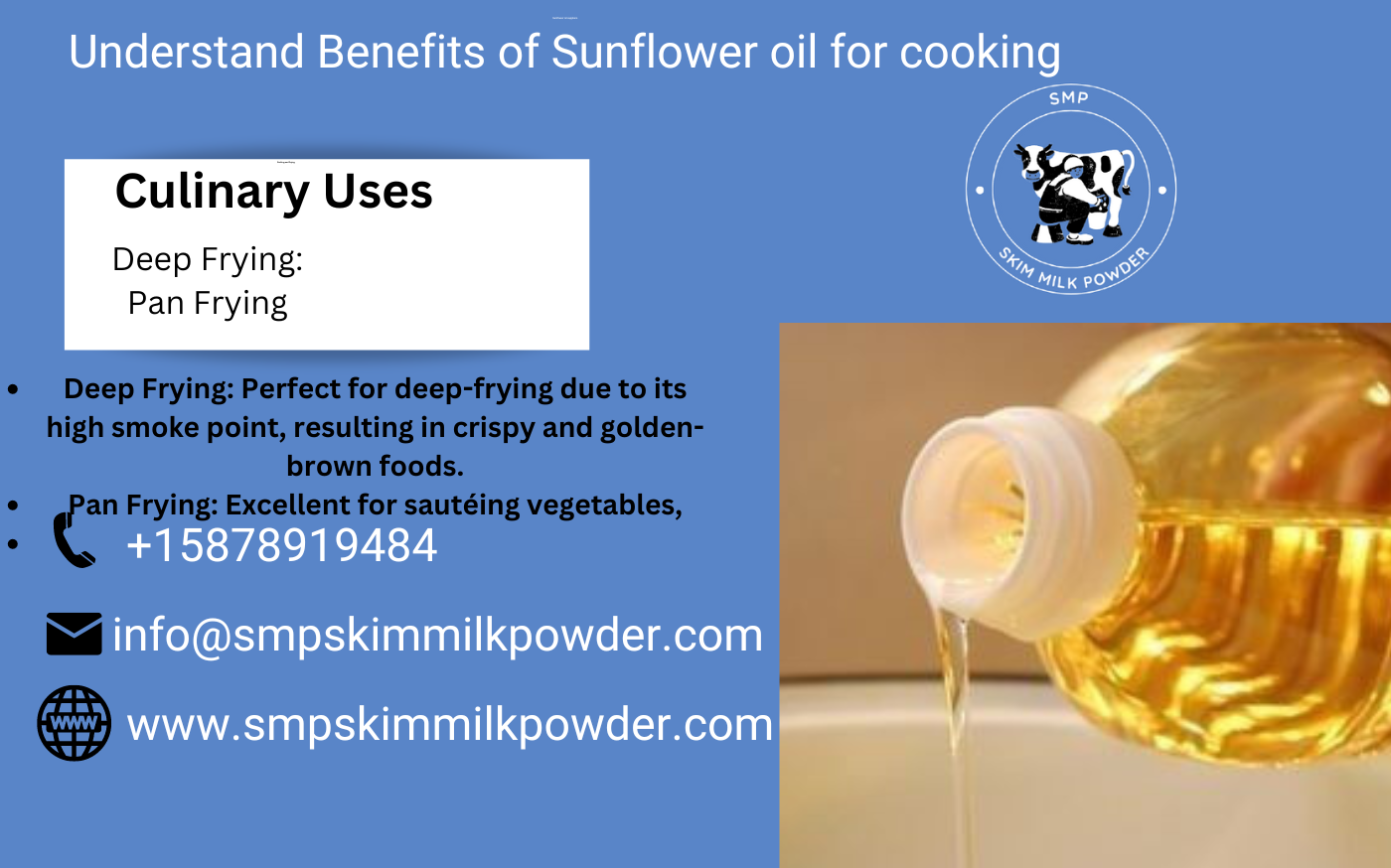Sunflower oil for cooking
Sunflower oil is a popular choice for cooking due to its light flavor, high smoke point, and health benefits. Here’s an in-depth look at its uses, benefits, and considerations in the culinary world:
Types of Sunflower Oil for Cooking
- Refined Sunflower Oil:
- High Smoke Point: Approximately 440°F (225°C), making it ideal for high-heat cooking methods such as frying, sautéing, and baking.
- Neutral Flavor: Doesn’t impart a strong taste, allowing the flavors of the other ingredients to shine.
- Versatility: Can be used in a wide range of recipes from frying to salad dressings.
- Unrefined Sunflower Oil:
- Lower Smoke Point: Less suitable for high-heat cooking but great for dressings, drizzling, and low-heat sautéing.
- Richer Flavor: Has a more pronounced nutty taste compared to refined oil.
- Nutrient-Rich: Retains more vitamins and phytochemicals that can be lost during the refining process.
- High Oleic Sunflower Oil:
- Healthier Option: Higher in monounsaturated fats (oleic acid) which are more stable at high temperatures and better for heart health.
- Extended Shelf Life: More resistant to oxidation, making it a preferred choice for cooking and baking.
Culinary Uses
- Frying:
- Deep Frying: Perfect for deep-frying due to its high smoke point, resulting in crispy and golden-brown foods.
- Pan Frying: Excellent for sautéing vegetables, meat, and seafood without burning or breaking down.
- Baking:
- Cakes and Pastries: Ideal for baking as it adds moisture and a tender crumb without overpowering the flavor.
- Breads: Used in doughs and batters to improve texture and extend shelf life.
- Salad Dressings and Marinades:
- Dressings: A base for vinaigrettes and creamy dressings, providing a smooth texture.
- Marinades: Helps in the infusion of flavors into meats and vegetables.
- Roasting and Grilling:
- Vegetables and Meats: Enhances the natural flavors of grilled or roasted foods while keeping them moist.
Health Benefits
- Heart Health:
- Cholesterol Management: Helps lower bad cholesterol (LDL) and increase good cholesterol (HDL) due to its high content of unsaturated fats.
- Blood Pressure: The presence of oleic acid can help maintain healthy blood pressure levels.
- Anti-inflammatory Properties:
- Antioxidants: Rich in vitamin E, which combats oxidative stress and inflammation.
- Digestive Health:
- Mild Laxative Effect: Helps in smooth digestion and can alleviate constipation.
Storage and Handling
- Proper Storage:
- Cool, Dark Place: Store in a pantry away from direct sunlight and heat to prevent oxidation.
- Sealed Container: Keep the bottle tightly closed to avoid exposure to air, which can lead to rancidity.
- Shelf Life:
- Refined Oil: Typically lasts about one year if stored properly.
- Unrefined Oil: Has a shorter shelf life and should be used within six months for optimal freshness.
Considerations
- Allergies:
- Generally considered safe for people with nut allergies, but it’s always best to check for any specific sensitivities.
- Nutrient Retention:
- Cold-Pressed Oils: Retain more nutrients and are ideal for dressings and low-heat applications.
- Refined Oils: Better for high-heat cooking but with slightly reduced nutrient content.
In summary, sunflower oil is a versatile and healthful option for various cooking methods. Its high smoke point and neutral flavor make it an excellent choice for frying, baking, and roasting, while its nutrient profile supports heart health and overall well-being. Proper storage ensures it remains fresh and effective for all your culinary needs. Buy cheap Sunflower oil for cooking in Germany, south Africa, India

